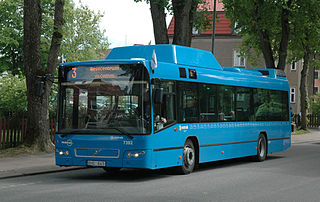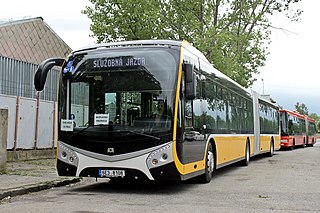
An articulated bus, also referred to as a slinky bus, bendy bus, tandem bus, vestibule bus, stretch bus, or an accordion bus, is an articulated vehicle, typically a motor bus or trolleybus, used in public transportation. It is usually a single-decker, and comprises two or more rigid sections linked by a pivoting joint (articulation) enclosed by protective bellows inside and outside and a cover plate on the floor. This allows a longer legal length than rigid-bodied buses, and hence a higher passenger capacity (94–120), while still allowing the bus to maneuver adequately.

The Scania N113 was a transverse-engined step-entrance and low-floor city bus chassis manufactured by Scania between 1988 and 2000.

The Volvo B7L is a fully low floor single-decker bus, double-decker bus and articulated bus chassis with a rear engine mounted vertically on the left of the rear overhang. It was built as a replacement for the Volvo B10L, and the Volvo Olympian. It was used as both a single-decker bus and a double-decker bus chassis largely in Continental Europe.

Van Hool NV is a Belgian family-owned coachbuilder and manufacturer of buses, coaches, trolleybuses, and trailers.

The Scania OmniCity is an integrally constructed transverse-engined low floor city bus that was available from Scania on the European market between 1997 and 2012.

The Scania 4-series low floor city bus and coach range was introduced by Scania in 1997 as a successor to the 3-series bus range.

The MAN Lion's City is a range of low-floor and low-entry public buses built by German truck and bus manufacturer MAN Truck & Bus since 1996 primarily for the European market, but is also available in chassis-only variants worldwide. The name Lion's City has been used since 2006, when MAN's public bus models which had been marketed separately were gathered into one range, when also most models received a facelift. The first models to be introduced were the 12-metre low-floor intercity bus NÜ xx3 (A20) in 1996, the 12-metre city bus NL xx3 (A21) in 1997 and the articulated NG xx3 (A23) in 1998. As with former MAN bus models the power-rating made up part of the model name, giving the NÜ-series buses with power-ratings of 260 and 310 hp model names NÜ 263 and NÜ 313 respectively. The main production sites are in Starachowice and Sady in Poland, but the models have also been built in Germany, Turkey and Malaysia. Initially most of the midibus variants were manufactured by Göppel Bus in Augsburg, later Nobitz.

Karosa B 741 is an articulated urban bus produced from 1991 to 1997 by bus manufacturer Karosa from the Czech Republic. In many towns they replaced Ikarus 280 made in Hungary. It was succeeded by Karosa B 941 in 1997.

MAN Truck & Bus SE is a subsidiary of Traton, and one of the leading international providers of commercial vehicles. Headquartered in Munich, Germany, MAN Truck & Bus produces vans in the range from 3.0 to 5.5 t gvw, trucks in the range from 7.49 to 44 t gvw, heavy goods vehicles up to 250 t road train gvw, bus-chassis, coaches, interurban coaches, and city buses. MAN Truck & Bus also produces diesel and natural-gas engines. The MAN acronym originally stood for Maschinenfabrik Augsburg-Nürnberg AG, formerly MAN AG.

The Volvo 7000, later Volvo 7700, was an integrally-constructed fully low-floor single-decker rigid bus and single-decker articulated bus built by Volvo between 1999 and 2012. It was generally available as 12-metre and 18-metre on both diesel and CNG, and from 2010 as a 12-metre hybrid electric. A trolleybus version has also been built.
The Volvo B10 was a front-engined bus chassis built in the 1930s, but may also refer to different 9.6-litre engined bus chassis from Volvo Buses:

The MAN NG272 was a low floor articulated single-decker bus built by MAN Nutzfahrzeuge from 1990 until 1992. It was an articulated development from the MAN NL202. Especially sold in Europe, in particular in Germany, it was replaced by the MAN NG272(2) (A11) in 1992.

The Scania Citywide is a series of integrally-constructed low-floor and low-entry buses manufactured by Scania from 2011 to 2024 as the successor to the Scania OmniCity and OmniLink. It consists of two models: the Citywide LF is built on the Scania N-series chassis, whereas the Citywide LE rides on the Scania K-series chassis. These were exclusively available in mainland Europe, except in the UK and Ireland, where Scania chose to rely on Alexander Dennis, Irizar and other local bodywork manufacturers instead. The series shares some front styling details with the Touring coach, while most of the design is a simple facelift from its prior models.

Karosa B 941 is an articulated urban bus produced from 1997 to 2002 by bus manufacturer Karosa from the Czech Republic. An upgraded version, Karosa B941E, was introduced in 1999. In many towns they replaced Ikarus 280 made in Hungary. In production was succeeded by Karosa B 961 in 2002.

SOR NB18 is a low-floor articulated single-decker bus produced by Czech bus manufacturer SOR since 2008. Since 2009 bus also comes with hybrid drive SOR NBH 18. In many towns they currently replace Karosa B 741 and Karosa B 941.

SOR NB12 is a fully low-floor single-decker bus produced by the Czech bus manufacturer SOR since 2008. In many towns they currently replace Karosa B 731, Karosa B 732 and Karosa B 931.

TEDOM Kronos 123 is a low-floor urban bus produced from 2004 to 2006 by the now defunct bus manufacturing division of the company TEDOM from the Czech Republic. It was replaced by TEDOM C 12 in 2006.

TEDOM L 12 is a low-entry intercity bus produced from 2006 to 2012 by the now defunct bus manufacturing division of the company TEDOM from the Czech Republic. The company ceased bus production in 2012.
The VöV-Standard-Bus is a standard for transit buses in Germany based on requirements by the VöV Association of German Transport Companies. The first concept was named Standard-Linienbus which resulted in multiple variants of VöV-Buses. The first generation was conceived in 1968 being in production to the mid 1980s when it was replaced by the second generation Standard-Linienbus II being in production up to 2000.

SOR NS 18 is a low-floor articulated single-decker bus produced by Czech bus manufacturer SOR since 2008. In many towns they will replace Karosa B 741 and Karosa B 941.


















